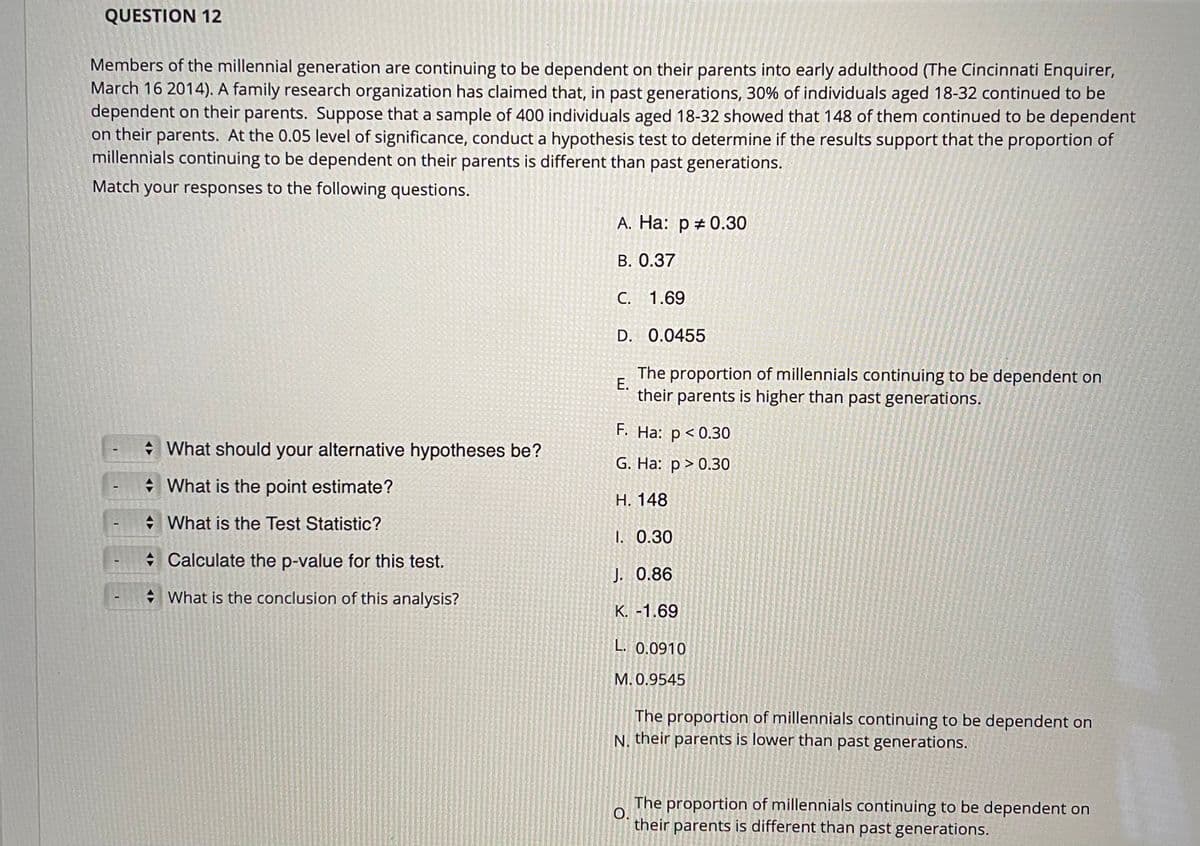Members of the millennial generation are continuing to be dependent on their parents into early adulthood (The Cincinnati Enquirer, March 16 2014). A family research organization has claimed that, in past generations, 30% of individuals aged 18-32 continued to be dependent on their parents. Suppose that a sample of 400 individuals aged 18-32 showed that 148 of them continued to be dependent on their parents. At the 0.05 level of significance, conduct a hypothesis test to determine if the results support that the proportion of millennials continuing to be dependent on their parents is different than past generations. Match your responses to the following questions. А. На: р+ 0.30 В. О.37 C. 1.69 D. 0.0455 The proportion of millennials continuing to be dependent on E. their parents is higher than past generations. F. Ha: p< 0.30 + What should your alternative hypotheses be? G. Ha: p> 0.30 + What is the point estimate? Н. 148 : What is the Test Statistic? I. 0.30 * Calculate the p-value for this test. J. 0.86 * What is the conclusion of this analysis? K. -1.69 L. 0.0910 M. 0.9545 The proportion of millennials continuing to be dependent on N. their parents is lower than past generations. The proportion of millennials continuing to be dependent on O. their parents is different than past generations.
Members of the millennial generation are continuing to be dependent on their parents into early adulthood (The Cincinnati Enquirer, March 16 2014). A family research organization has claimed that, in past generations, 30% of individuals aged 18-32 continued to be dependent on their parents. Suppose that a sample of 400 individuals aged 18-32 showed that 148 of them continued to be dependent on their parents. At the 0.05 level of significance, conduct a hypothesis test to determine if the results support that the proportion of millennials continuing to be dependent on their parents is different than past generations. Match your responses to the following questions. А. На: р+ 0.30 В. О.37 C. 1.69 D. 0.0455 The proportion of millennials continuing to be dependent on E. their parents is higher than past generations. F. Ha: p< 0.30 + What should your alternative hypotheses be? G. Ha: p> 0.30 + What is the point estimate? Н. 148 : What is the Test Statistic? I. 0.30 * Calculate the p-value for this test. J. 0.86 * What is the conclusion of this analysis? K. -1.69 L. 0.0910 M. 0.9545 The proportion of millennials continuing to be dependent on N. their parents is lower than past generations. The proportion of millennials continuing to be dependent on O. their parents is different than past generations.
Holt Mcdougal Larson Pre-algebra: Student Edition 2012
1st Edition
ISBN:9780547587776
Author:HOLT MCDOUGAL
Publisher:HOLT MCDOUGAL
Chapter11: Data Analysis And Probability
Section: Chapter Questions
Problem 8CR
Related questions
Topic Video
Question

Transcribed Image Text:QUESTION 12
Members of the millennial generation are continuing to be dependent on their parents into early adulthood (The Cincinnati Enquirer,
March 16 2014). A family research organization has claimed that, in past generations, 30% of individuals aged 18-32 continued to be
dependent on their parents. Suppose that a sample of 400 individuals aged 18-32 showed that 148 of them continued to be dependent
on their parents. At the 0.05 level of significance, conduct a hypothesis test to determine if the results support that the proportion of
millennials continuing to be dependent on their parents is different than past generations.
Match your responses to the following questions.
А. На: р + 0.30
В. О.37
C. 1.69
D. 0.0455
The proportion of millennials continuing to be dependent on
Е.
their parents is higher than past generations.
F. Ha: p< 0.30
+ What should your alternative hypotheses be?
G. Ha: p > 0.30
* What is the point estimate?
H. 148
* What is the Test Statistic?
I. 0.30
* Calculate the p-value for this test.
J. 0.86
+ What is the conclusion of this analysis?
K. -1.69
L. 0.0910
M. 0.9545
The proportion of millennials continuing to be dependent on
N. their parents is lower than past generations.
The proportion of millennials continuing to be dependent on
O.
their parents is different than past generations.
Expert Solution
This question has been solved!
Explore an expertly crafted, step-by-step solution for a thorough understanding of key concepts.
This is a popular solution!
Trending now
This is a popular solution!
Step by step
Solved in 2 steps

Knowledge Booster
Learn more about
Need a deep-dive on the concept behind this application? Look no further. Learn more about this topic, statistics and related others by exploring similar questions and additional content below.Recommended textbooks for you

Holt Mcdougal Larson Pre-algebra: Student Edition…
Algebra
ISBN:
9780547587776
Author:
HOLT MCDOUGAL
Publisher:
HOLT MCDOUGAL

Glencoe Algebra 1, Student Edition, 9780079039897…
Algebra
ISBN:
9780079039897
Author:
Carter
Publisher:
McGraw Hill

Holt Mcdougal Larson Pre-algebra: Student Edition…
Algebra
ISBN:
9780547587776
Author:
HOLT MCDOUGAL
Publisher:
HOLT MCDOUGAL

Glencoe Algebra 1, Student Edition, 9780079039897…
Algebra
ISBN:
9780079039897
Author:
Carter
Publisher:
McGraw Hill